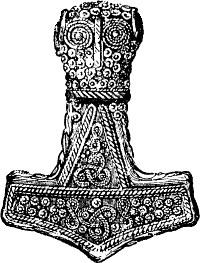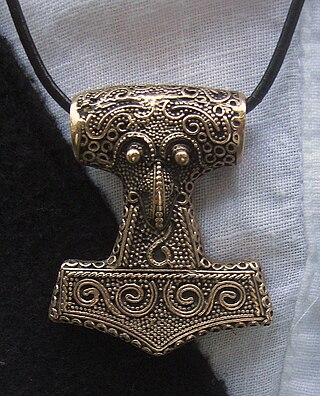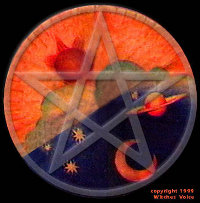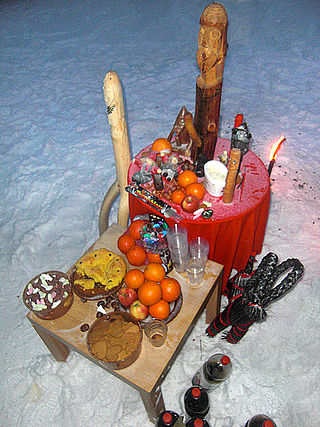
Heathenry is a modern Pagan new religious movement that has been active in the United States since at least the early 1970s. Although the term "Heathenry" is often employed to cover the entire religious movement, different Heathen groups within the United States often prefer the term "Ásatrú" or "Odinism" as self-designations.

Paganism is a term first used in the fourth century by early Christians for people in the Roman Empire who practiced polytheism, or ethnic religions other than Judaism. In the time of the Roman Empire, individuals fell into the pagan class either because they were increasingly rural and provincial relative to the Christian population, or because they were not milites Christi. Alternative terms used in Christian texts were hellene, gentile, and heathen. Ritual sacrifice was an integral part of ancient Greco-Roman religion and was regarded as an indication of whether a person was pagan or Christian. Paganism has broadly connoted the "religion of the peasantry".

Heathenry, also termed Heathenism, contemporary Germanic Paganism, or Germanic Neopaganism, is a modern Pagan religion. Scholars of religious studies classify it as a new religious movement. Developed in Europe during the early 20th century, its practitioners model it on the pre-Christian religions adhered to by the Germanic peoples of the Iron Age and Early Middle Ages. In an attempt to reconstruct these past belief systems, Heathenry uses surviving historical, archaeological, and folkloric evidence as a basis, although approaches to this material vary considerably.
The Troth, formerly the Ring of Troth, is an American-based international heathen organization. It is prominent in the inclusionary, as opposed to folkish, sector of heathenry. The organization was founded on December 20, 1987 by former Ásatrú Free Assembly members Edred Thorsson and James Chisholm. Chisholm remains associated with the organization as an Elder Emeritus. The current Steer is Lauren Crow.

David J. Wolpe is an American rabbi. He is Visiting Scholar at Harvard Divinity School and the Max Webb Emeritus Rabbi of Sinai Temple. He previously taught at the Jewish Theological Seminary of America in New York, the American Jewish University in Los Angeles, Hunter College, and UCLA. Wolpe was named the most influential Rabbi in America by Newsweek in 2012, and among the 500 most influential Angelinos in 2016 and 2018. Wolpe now serves as the Inaugural rabbinic fellow for the ADL, and a Senior Advisor for the Maimonides Fund. Wolpe resigned from an advisory group on antisemitism assembled by Harvard President Claudine Gay in December 2023 in response to what Wolpe characterized as a hostile environment to Jews at Harvard.

Polytheistic reconstructionism is an approach to modern paganism first emerging in the late 1960s to early 1970s, which gathered momentum starting in the 1990s. Reconstructionism attempts to re-establish genuine polytheistic religions in the modern world through a rediscovery of the rituals, practices and contextual worldviews of pre-Christian pagan religions. This method stands in contrast with other neopagan syncretic movements like Wicca, and ecstatic/esoteric movements like Germanic mysticism or Theosophy.

The Witches' Voice (WitchVox) was an online information and networking resource for the Wiccan and Pagan community. It is a non-profit organization founded and run by Wren Walker and Fritz Jung in 1997. It won Peoples' Choice under Spirituality in the 2002 Webby Awards, and is considered one of the "most extensive" Pagan websites. The organization's website was retired on December 31, 2019.
M. Macha NightMare is an American Neopagan witch. She was born in Milford, Connecticut and was one of the founders of the Reclaiming Collective in the 1970s.
Green Egg is a Neopagan magazine published by the Church of All Worlds intermittently since 1968. The Encyclopedia of American Religions described it as a significant periodical.
Modern paganism in the United States is represented by widely different movements and organizations. The largest modern pagan religious movement is Wicca, followed by Neodruidism. Both of these religions or spiritual paths were introduced during the 1950s and 1960s from Great Britain. Germanic Neopaganism and Kemetism appeared in the US in the early 1970s. Hellenic Neopaganism appeared in the 1990s.

In the modern pagan movement of Heathenry there are a number of holidays celebrated by different groups and individuals. The most widely observed are based on ancient Germanic practices described in historical accounts or folk practices; however, some adherents also incorporate innovations from the 20th and 21st centuries.

Modern paganism in Scandinavia is almost exclusively dominated by Germanic Heathenry, in forms and groups reviving Norse paganism. These are generally split into two streams characterised by a different approach to folk and folklore: Ásatrú, a movement that been associated with the most innovative and Edda-based approaches within Heathenry, and Forn Siðr, Forn Sed or Nordisk Sed, a movement marked by being generally more traditionalist, ethnic-focused and folklore-rooted, characterised by a worldview which its proponents call folketro. Forn Siðr may also be a term for Scandinavian Heathenry in general. Vanatrú defines the religion of those individuals or groups in which the worship of the Vanir dominates.
Patheos is a non-denominational, non-partisan online media company providing information and commentary from various, mostly religious, perspectives.

"Heathenry" as it is expressed in Canada is used as a universal term to describe a wide range of Germanic Neopaganism. Those who practice the religions or folk-ways of Ásatrú, Forn Sed, Odinism or Theodism are all considered part of a greater Heathen umbrella. In Canada, Heathenry takes a socially liberal standing in its philosophy. The exclusion of adherents on the basis of ethnic origin, sexual orientation, other group affiliation as well as other discriminatory factors is opposed by most Canadian Heathen groups, although there are, as in the United States a small number of racially minded groups that limit their membership to those of "Nordic ancestry".
Pagan studies is the multidisciplinary academic field devoted to the study of modern paganism, a broad assortment of modern religious movements, which are typically influenced by or claiming to be derived from the various pagan beliefs of premodern Europe. Pagan studies embrace a variety of different scholarly approaches to studying such religions, drawing from history, sociology, anthropology, archaeology, folkloristics, theology and other religious studies.
Heathenry in the United Kingdom consists of a variety of modern pagan movements attempting to revive pre-Christian Germanic religiosities, such as that practised in the British Isles by Anglo-Saxon and Nordic peoples prior to Christianisation.

Modern pagan music or neopagan music is music created for or influenced by modern Paganism. Music produced in the interwar period include efforts from the Latvian Dievturība movement and the Norwegian composer Geirr Tveitt. The counterculture of the 1960s established British folk revival and world music as influences for American neopagan music. Second-wave feminism created women's music which includes influences from feminist versions of neopaganism. The United States also produced Moondog, a Norse neopagan street musician and composer. The postwar neopagan organisations Ásatrúarfélagið in Iceland and Romuva in Lithuania have been led by musicians.
TheScottish Pagan Federation (SPF) is a Scotland-based organisation which works to support the Neopagan community in Scotland. Originally part of the Pagan Federation, it became an independent organisation in 2006. The group seeks to promote tolerance of Neopaganism, spread information to the public, interface with other religions through interfaith activities, defend Neopagans from religious discrimination, and provide a network for Scottish Neopagans. They have been members of Interfaith Scotland since 2013. They run an annual conference which brings together Neopagans from across the country as well as an annual summer camp. In 2021 they announced the release of an official tartan intended for the use of Neopagans worldwide.
Modern paganism, also known as contemporary paganism and neopaganism, is a collective term for new religious movements which are influenced by or derived from the various historical pagan beliefs of pre-modern peoples. Although they share similarities, contemporary pagan religious movements are diverse, and as a result, they do not share a single set of beliefs, practices, or texts.
The Wild Hunt is a nonprofit online pagan news outlet. Created as a blog by Jason Pitzl-Waters in 2004, it was edited by Heather Greene from 2014- 2018 and subsequently by Manny Tejeda y Moreno. In 2007 it had 182,100 unique visitors. In 2016 it had ten regular writers and three columnists.








